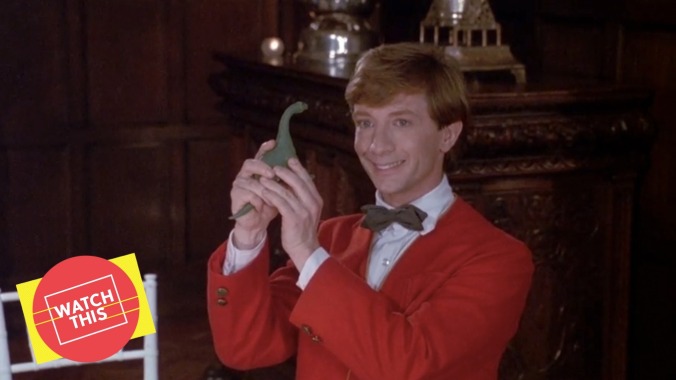This box-office flop is the only movie that let Martin Short be Martin Short

Watch This offers movie recommendations inspired by new releases, premieres, current events, or occasionally just our own inscrutable whims. This week: With the release of Andy Samberg’s Palm Springs and the latest Ghostbusters sequel getting pushed to 2021, we’re highlighting movies starring Saturday Night Live alumni.
Clifford (1994)
When Martin Short says, “I’m gonna go big,” he means it. Especially when he’s making that declaration 18 minutes into Clifford, a movie where he’s already been pummeled by a suitcase, flung a toy dinosaur into the air from an airplane tray table, and made an apoplectic Richard Kind look like he’s underacting. If there’s a unifying trait to Short’s performances in SCTV, Saturday Night Live, and the 1994 cult classic that was essentially the end of “Martin Short, Movie Star,” it’s bigness. Which is ironic in that last case, because the visuals of Clifford do as much as they can to make Short, playing a 10-year-old boy hellbent on visiting a prehistoric theme park, appear very small.
Short is one of our last great variety performers, an actor of range who can carry a tune and whose wild physicality both translates to choreography and plays all the way to the cheap seats. Before he was a kid in Clifford, he played characters like Ed Grimley, Jackie Rogers Jr., and Ned Nederlander with the busting-out-all-over energy of a child—something that kills in a sketch, but can be difficult to sustain for an entire feature. Clifford puts this to the test: Every new set piece, every absurd escalation in the battle of wits between Clifford (Short) and his architect uncle Martin (Charles Grodin), risks burning the audience out. Contemporary reviews suggests it did just that, leaving a Rotten Tomatoes fossil record littered with criticisms like “wearying,” “obnoxious,” and “gimmicky.” Yet if you’re tuned into Short’s peculiar wavelength, his indefatigability keeps Clifford aloft. Just when you think he and the movie might be losing steam, director Paul Flaherty (another SCTV alum) sends them galloping across a train platform, belting out a Judy Garland impression.
Clifford is full of huge swings like this, and a remarkable number of them connect—each a defiant gesture against conventional wisdom. Most movies don’t cast an established, 40-year-old star as an elementary schooler whose tailor apparently specializes in clothes for Angus Young ventriloquist dummies. Most film comedies wouldn’t position that manchild as a vessel of grinning malevolence preternaturally gifted at manipulating people as well as electronics. Clifford could be read as a devilish parody of the “kids rule, adults drool” capers that rode to the multiplex on the coattails of Home Alone and Nickelodeon, were it not for the fact that Clifford was shot the same year as Kevin McCallister’s first encounter with the Wet Bandits, only to become one of several movies waylaid by the bankruptcy of Orion Pictures. Imagine building the elaborate, only-in-the-movies combination of Audio-Animatronics and roller coaster design that plays the setting for Clifford’s climax, only to wait four years before getting to show it off—and then having to wait even longer for the film’s reputation to be rehabilitated by comedy geeks and the kids who’d grown up watching it on VHS.
In the time that passed between Clifford’s completion and its release, Grodin had fronted the first two Beethoven movies, doing a parallel-universe take on Martin’s mounting middle-aged-square exasperation opposite a Saint Bernard. He’s indispensable here, providing Short with a foil who plausibly won’t put up with Clifford’s tomfoolery, but can also go as big as his co-star if need be. (The crowning achievement of Flaherty’s direction involves putting Short, Grodin, and Kind in the same film while disguising all the giant cartoon bite marks they’ve left in the scenery.) There are times when Clifford is practically a two-hander powered by the friction between Short and Grodin’s outrageously selfish characters: The boy using his uncle to get a trip to Dinosaur World, the man using his nephew to convince his fiancé, Sarah (Mary Steenburgen), that he’s ready to start a family.
There’s an argument to be made for Clifford as a projection of the anxieties of first-time parenthood, Short embodying the worst-case-scenario a guy like Martin would dream up. But that’s awfully highfalutin for a film that builds space into a house party sequence in order for Short to channel Ed Grimley on the dance floor. Somewhere in the journey from script to screen, someone tried to force filmmaking norms of growth and resolution onto Clifford, but as important as its lessons in empathy are, it’s a lot better when it’s allowed to just be itself: 90 minutes articulating Short’s tactic of entertainment at all costs. Clifford believes, perhaps incorrectly, that “Dinosaur World is the only place where a boy like me can be happy.” Clifford is the only movie where Martin Short can be Martin Short.
The film recognizes that this is all very strange. As Martin starts to come unglued, he wraps up a heart-to-heart by barking at his nephew: “Look at me like a human boy!” As Grodin speaks the idiosyncratically fussy language of Clifford, his dialogue plays over footage of Short pulling faces and adjusting his posture. Every choice—the camera holding on Short, the actor’s glassy-eyed countenance, the way Martin’s rising temperature causes Grodin to slam one line into the next—couldn’t happen in any other movie. Who else would think to let it happen this way, or even allow it to? That’s the cracked genius of Clifford in a nutshell.
Availability: Clifford is streaming on HBO Max, and is available for rental or purchase from Amazon, Google Play, iTunes, YouTube, Microsoft, Fandango, and VUDU.